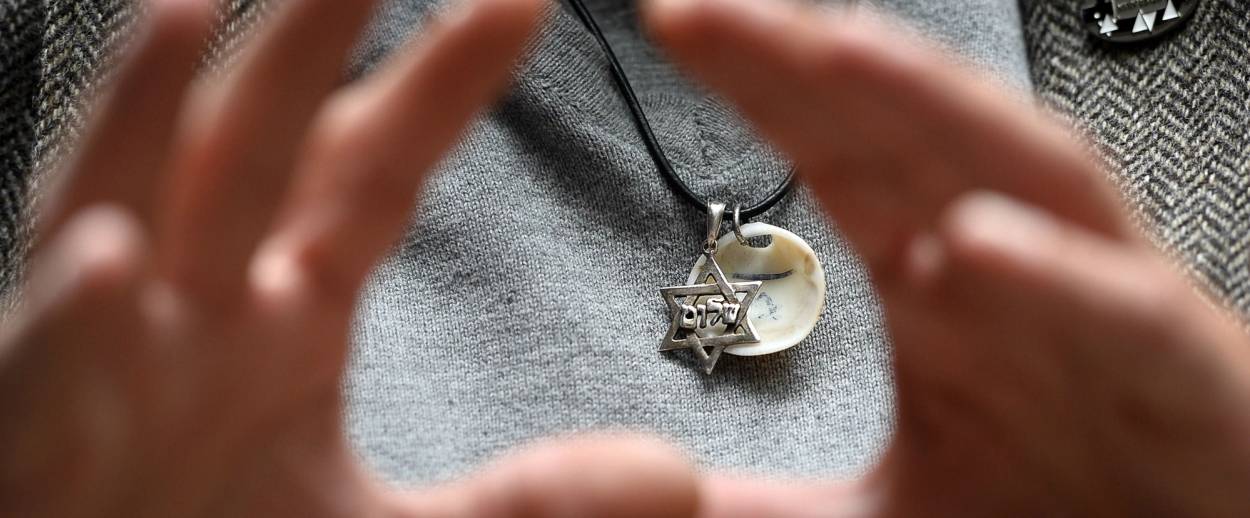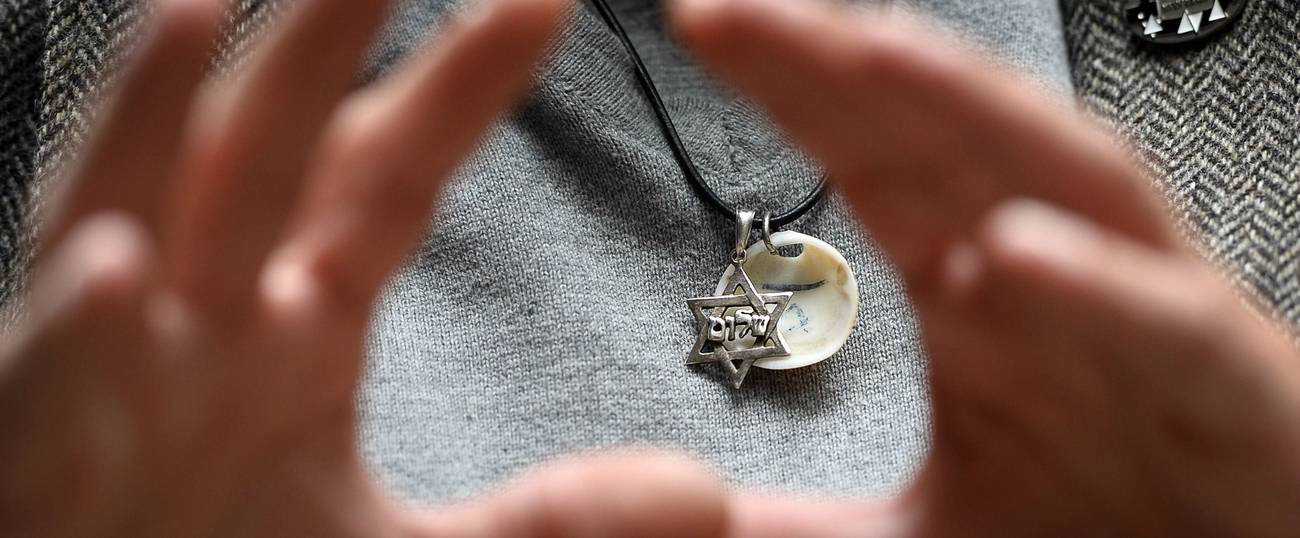Jewish Bling, in Conversation
How does wearing a Magen David necklace in public make you feel?




Hi MaNishtana —
As you know, I was smitten with the Magen David necklace you wore to the staff meeting last week. It was so BIG, so not like a girlie necklace, and I liked the sharp angles and rivets and vibe that felt kind of steampunk and kind of bike messenger. The aesthetic seemed so interestingly at odds with the symbol to me…and I guess that’s something I wanted to talk about, the associations I (we?) have with a Magen David necklace, which I’m starting to realize are troubling.
I possess the standard ultra-femme Tiffany Star of David necklace, which I never wear, because to me it’s code for attributes I don’t want to convey: consumerism, conformity, a kind of sorority-house shorthand that’s not my own and not one I’d ever choose. To me, a delicate Jewish star necklace on a woman reads princess, reads sheltered, reads “narrow experience of the world.” But I wonder if that’s not also a sign of my own internalized anti-Semitism and misogyny.
Further: I recall with some shame that I asked you, “Are you scared to wear it on the subway?” To me, a white girl, that question has an entirely different resonance than it would for you, a black man. The fact that that sentence popped out of my mouth was a sign of the privilege I’m apparently so eager to point fingers at in other people. Asking you, essentially, “GARSH, will someone say something MEEN and anti-Semitic to you? Will people give you the JAP side-eye?” is a reflection of my concerns as a white Jewish woman considering whether to wear a Jewish star necklace in a non-Jewish setting. You, on the other hand, wear simultaneous identities of Black American man, Black Jew, and DUDE IN A NECKLACE, all of which are semiotically SUPER-DUPER-DIFFERENT from my own mishegas.
So, uh, that’s a lot of shit in three short paragraphs.
xoxo
— m
***
Marjorie!
Firstly, let me get a bit of fan gushing confessional out of the way: I was a large consumer of teen girl magazines in the 90’s. Particularly the “Where To Find A Guy” issues. Not because I was looking for a guy, but because I needed to know where I needed to be. But I totally loved Sassy magazine, so it’s kind of mind-blowing to be in an email tête-à-tête with someone whose articles I would devour.
Having said that, as very black man me, it is a little amusing to hear white girl you worried about people saying MEEN things to you for wearing a Magen David. Then I realized that that would also have a very different resonance for you as a female who has to deal with harassment just by dint of your biological situation in general as opposed to the limit of what I would ever experience as a male. Yay patriarchy! Or male privilege. Or rape culture. Whichever.
As for the issue of wearing a Magen David period I’ve wrestled with that for a while, mostly because as a brown person I’m more often than not assumed to be a Hebrew Israelite, which tends to open the door to unwelcome encounters with Israelites who think they’re addressing a kindred spirit. Then there are also the subway preachers who see the symbol and feel the need to try and exorcise the Jew-demon from me by showing me the light, the way, and the truth. From white people, of both the Jewish and non-Jewish variety, I either get the curious looks, the curious questions, or people who feel the need to inform me that I am, in fact, wearing a Jewish star. (Thank you for that, by the way. For a second there I thought I was wearing a Picasso-inspired crucifix).
But am I scared to wear it on the subway? Not any more than I am of getting on the subway in my kippah and tzitzit. Or in my skin, actually. That’s probably a better example, right? I hear it’s a dangerous thing to be wearing around these parts. Particularly around police.
— MaNishtana
***
MaNishtana —
You want me to say I’m a big conflict-averse chicken? FINE. I’m a big conflict-averse chicken. I like to provoke people in my writing while cringing away from any actual confrontation in person. I worry that if I wear the necklace in public people will challenge me about Palestinian rights (the symbol seems to embody people’s inability to separate Judaism in all its rich history and culture from modern-day Israeli politics) or mutter something at me about killing their Lord and Savior. (Hey, blame the Romans and boycott barley.)
You are kind to be tolerant of my anxiety. Yes, I’m acutely aware of walking around in a female body and being a feminist loudmouth in our culture, but as a white lady I do not have to live the corporeal experience you do in your black male body. So uh, thanks for your generous bridge-building, and yay intersectionality!
So back to the farshtunkiner necklace. Rather than ASSUMING that dainty little Magen David necklaces on women are symbols of wealth and privilege and insularity, it would probably behoove me to ASK what women who wear them think they express. Symbols definitely have meaning—I mean, I have agita about Israeli flag lapel pins because the wearer tends to be more right-leaning than I. And like you, I enjoy pondering exactly what meaning(s) symbols convey. (I was a folklore and mythology major in college. I’m not over it.) I actually DO have a Jewish star necklace I enjoy wearing: It is in the shape of a rosary, designed by Jewish artist Carlen Altman. I adore her work (she seems to be taking a break right now, but she also makes an awesome oversized Talking Moses ring with a hidden lever you can push to make Moses’ mouth move!). I have two of her Jewish rosaries. One is a delicate chain of light blue faceted glass beads with a filigree Jewish star at the end, which I wear to shul; the other, which I wear on Purim and to super-Jewish hipster cultural events, has bold red beads and is adorned with tiny silver charms of a matzoh, a fiddler, a gefilte fish and a dreidel, and the Jewish star on the bottom of the rosary is seriously big, though not as seriously big as the one on your beautiful necklace. I don’t see my Jewish rosary as mocking Catholicism or Catholic iconography. I see it as a way to trigger a grin along with questions about ecumenicism, religious fashion choices, and living in a diverse world. (Given that the shape of the necklace is visibly Catholic, I did check with a friend of my family’s, a Catholic nun and professor, who told me that she thought the necklace was funny and potentially bridge-build-y, but that I probably shouldn’t wear it to a wake.) Anyway: I feel like a giant LOOK-AT-ME Jewish star or an edgy Jewish star is a more positive symbol for me than that damn teeny Elsa Peretti thing that every Long Island girl gets for her bat mitzvah.
Your Sassy pal,
— m
***
I’ve never been personally comfortable with the overly huge Magen David; the one I currently wear is massively out of my comfort-zone, it’s only saving grace for me being the riveted steampunk look it has. Otherwise, it’s really just a large sign screaming “I AM ALL THE JEWARSH!!!” for no real reason. It’s not like a Magen David has any religious significance or is anything more than an arbitrarily chosen symbol to represent Judaism. After all, depending on the time and place, we could literally be having this same conversation as two Jews about the pentagram (“Hey, do you feel nervous wearing your pentagram on caravans transporting spices from the Orient?”).
I totally loved the rosary Magen David look, and was two seconds away from picking one up myself. My wife—the daughter of a very church-every-Sunday Catholic father—was like “Uh, no. Don’t do that. That’s appropriative. Would you appreciate it if a Catholic was wearing a tallit embroidered with crosses?”
And I admit that, no, no that is not a thing I would like. So I stay away from the cool-looking rosary Magen David. Much like I stay away from those Israeli-style Hebrew printed keffiyehs. Despite the fact that there may or may not be photos of me on the interwebs modeling said Israeli-style Hebrew printed keffiyehs.
Also you are not alone in those “Ugh, here’s another JAP” feelings whenever those damn teeny Elsa Peretti things rear their privileged Long Island head with their faux-daintyness. But is it just the Jewish symbol wearing thing that you’re wary of on subways or specifically the Magen David?
— MaNishtana
***
[Rushes to computer to Google-search “Manishtana in keffiyeh”] No luck. (But for some reason one of the hits was a tank top saying “Oy Vey, Look at Her Tush” — let’s both pretend this never happened.)
Who knew there were so many layers to necklace-wearing? (Sarah Palin knew, apparently Ugh.) But now that you’ve made me think about it: No, I would not have a problem wearing other Jewish symbols on the subway. A megillah, a hamsah, a small laser-etched portrait of Bernie Sanders… I mean, I have giant Hebrew letters literally tattooed on my arms, and I show those without fear. So there’s something about the Magen David that I associate with a narrow worldview. And maybe it’s an internalized misogynistic thing I gotta wrestle with; surely not every woman in that dainty pendant is an Oh My God Becky. But in terms of personal sartorial choice, no, not going there.
The upshot here—that I’m betting we can both agree on—is that symbols have power. And associations that sometimes are transparent and sometimes not. (Which is why SHUT UP about the swastika being an ancient sanskrit symbol co-opted by the yadda yadda, assholes.) But to bring this back to where it all started: I really like that big old riveted necklace.
ALL THE JEWARSH —
— m